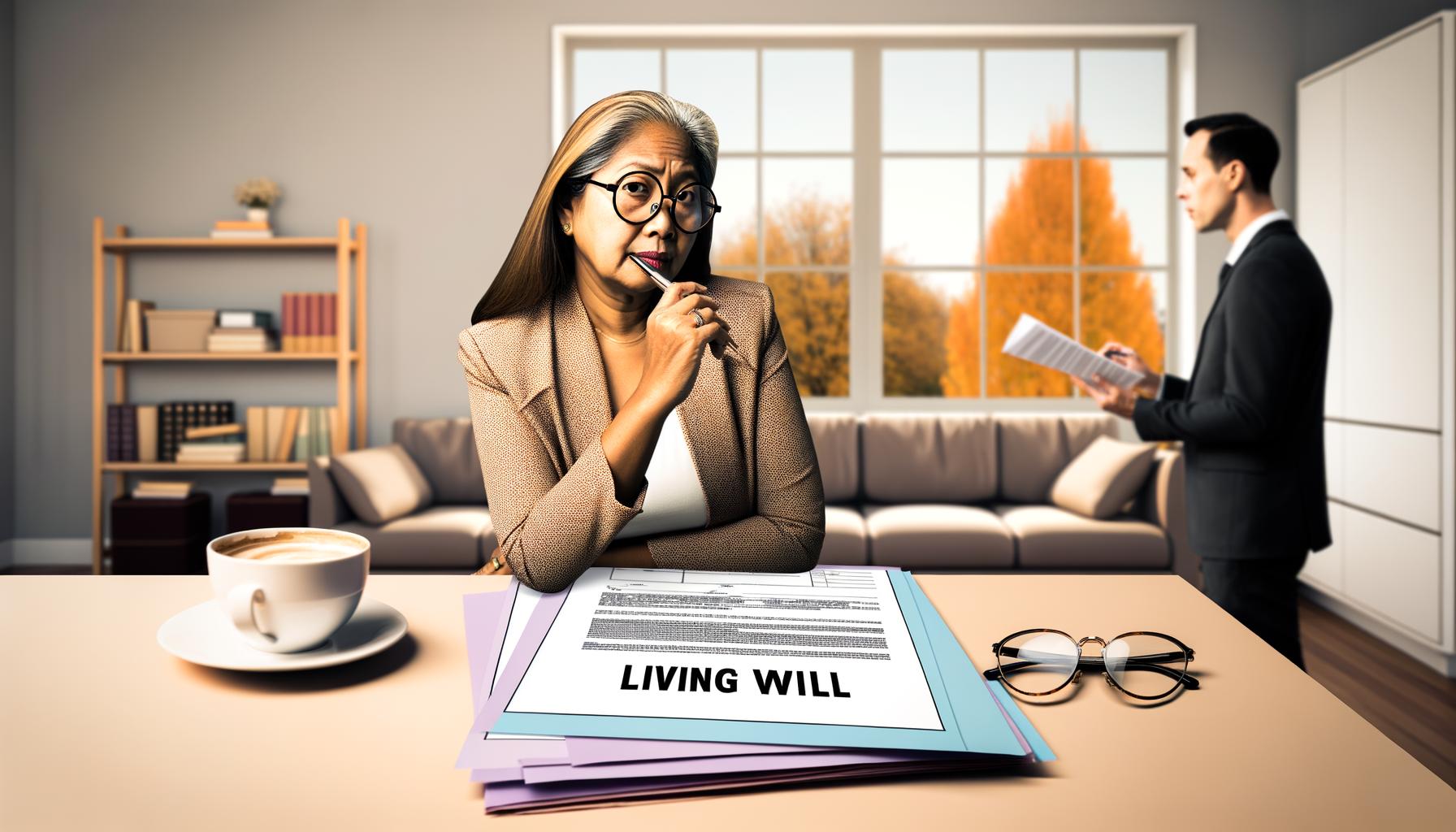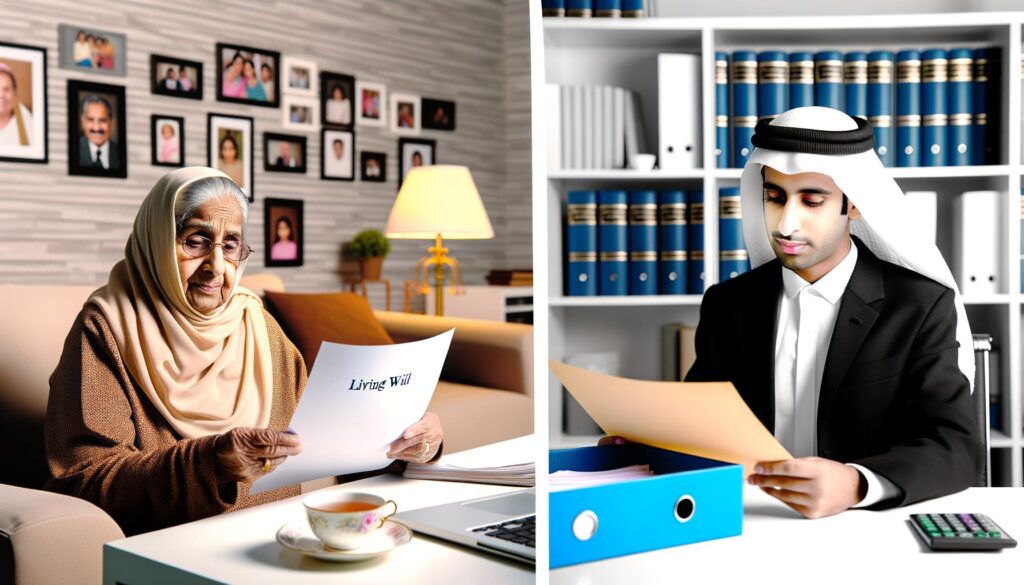Living wills are an essential component of estate planning, empowering individuals to dictate their medical preferences in scenarios where they might be unable to communicate them personally. In the city of Mission Viejo, understanding and implementing living wills is particularly significant given the local demographics and healthcare landscape. This article aims to guide Mission Viejo families through the intricacies of crafting living wills, emphasizing why these documents are crucial for peace of mind and practical decision-making.
A living will delineates a person’s choices concerning medical treatments in situations where they may no longer have the capacity to voice these decisions themselves. Common scenarios include severe illness, accidents leading to incapacitation, or other life-threatening conditions. By having a living will, individuals can ensure that their health care aligns with their values and wishes, hence relieving family members from making those tough decisions during already stressful times.
For residents of Mission Viejo, creating a comprehensive living will holds even more significance due to the community’s unique attributes. The city’s population includes a considerable number of retirees and older adults who may face advanced medical care needs sooner rather than later.
Moreover, Mission Viejo offers a range of medical facilities and specialists well-versed in handling end-of-life care options and ethical dilemmas. Addressing local perspectives and resources sets a solid foundation for residents aiming to put together effective living wills tailored specifically for their personal circumstances and community environment.
Understanding the Basics of Living Wills
Living wills serve as vital tools in ensuring that your healthcare preferences are respected, especially during times when you might be unable to communicate them yourself. A living will is a legally binding document that outlines specific medical treatments and procedures you would or would not want if you become incapacitated. For Mission Viejo families, understanding the legal framework specific to California is crucial for creating a valid and enforceable living will.
Legal Framework: Overview of California State Laws Regarding Living Wills
California has specific laws governing the creation and enforcement of living wills. These laws outline what elements must be included for the document to be considered valid. In California, living wills are often referred to as Advance Health Care Directives.
This directive allows residents to appoint a healthcare agent-a person who will make healthcare decisions on their behalf if they are rendered incapable of doing so themselves. It also permits the inclusion of detailed instructions about medical treatments, such as organ donation preferences and end-of-life care wishes. It’s important for residents of Mission Viejo to adhere closely to these state laws when drafting their living wills to ensure their decisions are honored without legal complications.
Key Components: Necessary Elements That Make Up a Living Will
When crafting a living will, certain components are essential for it to function effectively and legally. Key elements typically include personal identification information, clear statements reflecting your healthcare preferences under various medical scenarios, and your signature witnessed by two adults or notarized. Additionally, designating a durable power of attorney for healthcare can further strengthen your directives’ enforceability.
This individual should be someone you trust implicitly, as they will have significant authority over critical health-related decisions should the need arise. For Mission Viejo families particularly concerned with nuanced local issues or specific cultural sensitivities, tailoring these key components appropriately can ensure that the living will aligns well with personal values while complying with state requirements.
Common Misconceptions: Clarifying Myths and Misunderstandings About Living Wills
Despite their importance, several misconceptions persist about living wills that often deter individuals from creating one or cause confusion regarding their scope and effect. One prevalent myth is that a living will means no further medical treatment; however, it actually specifies which treatments you prefer under circumstances where recovery is unlikely or life support becomes futile.
Another misunderstanding is that living wills only pertain to elderly individuals; in reality, people of any age can become incapacitated due to illnesses or accidents at any time, making it prudent for all adults to have one in place. For those in Mission Viejo, there may also be regional myths linked to local practices or cultural beliefs-addressing these directly through open discussions with family members and professional advisors can mitigate fears and provide clarity.
By comprehensively understanding the basics outlined above-grasping both the legal framework in California and debunking common myths-Mission Viejo families can create effective living wills tailored specifically for their unique needs and circumstances.

Steps to Creating a Living Will
Creating a living will is an essential step in ensuring that your healthcare wishes are honored should you become unable to communicate them yourself. The journey begins with clarifying your personal health care preferences and identifying situations where you would prefer specific medical interventions or the lack thereof.
This initial planning phase involves introspection and sometimes extensive research to understand different medical treatments and their implications fully. Whether it’s deciding on resuscitation efforts, life support measures, or organ donation, taking the time to document your thoughts can provide peace of mind.
Initial Planning: Identifying Your Wishes and Healthcare Preferences
The starting point for drafting a living will is to thoroughly contemplate what end-of-life care means to you. Reflect on past experiences with family members or friends who faced critical health decisions, consider your personal values, religious beliefs, and strive to picture various scenarios where significant medical choices might be required.
Take notes as you evaluate these factors because they will form the foundation of your living will. It’s also helpful to discuss these topics informally with close family members for added perspective.
Consulting Professionals: The Role of Attorneys and Healthcare Providers
After outlining your general wishes, the next step involves consulting professionals who specialize in living wills. Attorneys well-versed in California state law can ensure that your document meets all legal criteria and accurately reflects your intentions.
Similarly, healthcare providers can offer insights into medical realities that may impact how you form part of your living will language. Professional advice not only lends credibility but also ensures that all bases are covered-from statutory compliances like signatures and witnesses to alignment with other vital documents such as durable powers of attorney for health care.
Detailed Checklist: Step-by-Step Guide to Ensure No Detail Is Overlooked
To streamline the process further, using a checklist can be incredibly beneficial. Start by writing down all relevant personal information-your full name, date of birth, address-as well as emergency contact details for loved ones involved in carrying out the directives specified in your living will. Next, enumerate each type of medical treatment you’re addressing (e.g.
mechanical ventilation, dialysis), specifying clear instructions for each one according to varying circumstances (e.g. terminal illness vs temporary incapacity). Don’t forget ancillary matters such as funeral arrangements or body disposition preferences if those align with broader end-of-life plans.
Family Involvement and Communication
Effective communication with your family is a cornerstone of creating a meaningful and enforceable living will. Before finalizing your living will, it is essential to have open and honest conversations with your loved ones about your healthcare preferences and end-of-life wishes. These discussions help ensure that everyone understands your decisions and can offer support when the time comes.
To facilitate these conversations, consider scheduling a dedicated time to talk openly with close family members. Addressing sensitive topics such as life-sustaining treatments, pain management, and organ donation may be challenging, but it is crucial for aligning everyone’s understanding. Using clear language and providing specific examples can help make the conversation more effective. Additionally, preparing written notes or an outline of key points you wish to discuss can keep the dialogue focused and productive.
Addressing concerns and alleviating fears about living wills should also be part of this discussion process. Many people harbor misconceptions or feel uneasy discussing what often feels like a taboo subject. It might be helpful to explain how a living will serves not just as a directive but as a reassurance that their wishes will be respected in situations where they cannot communicate themselves. Highlight the importance of having these directives to prevent potential conflicts among family members.
Recording these conversations in written form or through audio/video means can provide valuable documentation for future reference. Such records ensure there is clarity about your intentions and can serve as supportive evidence if disputes regarding your wishes arise later on. Maintaining this documentation in an organized manner alongside other important documents like health care proxies or powers of attorney will create a cohesive record that reflects your healthcare desires comprehensively.

By involving family members in these critical discussions surrounding living wills, Mission Viejo families can foster an environment of mutual respect and understanding, ensuring that everyone is prepared to honor the individual’s choices effectively during difficult times.
Customizing Your Living Will for Mission Viejo Residents
Understanding the unique healthcare landscape and community values of Mission Viejo is vital when customizing your living will. Local healthcare facilities, such as Mission Hospital and Saddleback Medical Center, offer a variety of services that may influence your decisions. Familiarize yourself with these institutions to ensure your directives align with the capabilities and specialties available locally. This can be critical in emergencies where knowing the resources at hand could streamline the execution of your living will.
Integrating a living will with other pertinent legal or medical documents is another crucial step for Mission Viejo residents. Many people already have end-of-life documents, like advance healthcare directives or powers of attorney, which need to be harmonized with their living wills.
Overlaps in these documents can lead to confusion; therefore, it’s wise to consult with legal professionals to ensure all elements are cohesive and legally sound in the context of California laws. Clear and consistent documentation guarantees that medical providers can honor your wishes without hesitation.
Lastly, consider the cultural and community-specific aspects when tailoring your living will. Mission Viejo is home to a diverse population with various cultural beliefs and practices that might impact end-of-life care preferences. Incorporating personal values and community norms into your living will ensures it reflects not only your individual choices but also respects broader traditions important to you.
For example, certain religious preferences or family-centric decision-making processes should be clearly articulated within your document. To aid in this process, reach out to local community leaders or cultural organizations for guidance on how best to incorporate these values into your living document.
By focusing on these local intricacies – from familiarizing yourself with nearby healthcare facilities, integrating existing documentation properly, to honoring cultural norms – you can create a robust and respectful living will that truly represents who you are as a resident of Mission Viejo.
Updating and Maintaining Your Living Will
Trigger events often necessitate revisions to a living will, making it essential to be aware of these moments when modifications should be made. Life changes such as marriage, divorce, birth of a child, or death of a family member may influence who you want as your healthcare proxy or alter specific directives within the document itself.
Changes in health status, whether it’s the diagnosis of a serious illness or recovery from one, are equally important triggers for revising your living will. Staying ahead by proactively updating ensures there are no discrepancies between your current wishes and what’s documented.
Equally vital is how you store and make accessible your living will. Ensure that both digital and physical copies are kept in places where they can be easily found by designated individuals like family members or legal representatives. Discussing the location where these documents are stored with loved ones can prevent any delays during emergencies.
Some also choose to keep digital versions on secured online portals where healthcare providers can quickly access them when needed. Mission Viejo residents should consider utilizing local resources such as hospitals that offer storage services for medical directives like living wills, thereby adding an extra layer of accessibility and security.
| Update Frequency | Reasons for Updates |
|---|---|
| Every 2 years | Changes in medical conditions/treatments |
| Trigger Events (Marriage, Divorce, Birth/Death) | Reflect new life circumstances |
| Post-Health Event Reviews | Makes sure document aligns with current health status |
The Legal Process in Mission Viejo
The legal process of filing a living will in Mission Viejo requires careful attention to state-specific regulations and local procedures. First, residents must ensure their living will complies with the California Probate Code, which governs advance healthcare directives. This document typically needs to be notarized or signed by two witnesses who aren’t related by blood or law, healthcare providers, or named as beneficiaries in the individual’s estate.
Once the living will is properly formatted and executed according to state requirements, it’s essential to file this document where it will be readily accessible in times of need. In Mission Viejo, individuals can choose to store their living wills with their primary healthcare provider or hospital. They should also consider registering their directive with California’s Advance Healthcare Directive Registry for broader recognition across medical facilities within the state.

Ensuring compliance and enforcement involves handing copies of the living will to relevant parties like family members, attorneys, and possibly religious advisors. Local resources such as community clinics often offer programs assisting seniors and families with understanding and crafting these documents. Moreover, many law firms in Mission Viejo specialize in estate planning and can provide valuable guidance through the nuances of creating an enforceable living will.
| Requirement | Description |
|---|---|
| Signature/Witnesses | Notarized or signed by two qualified witnesses |
| Storage | Filed with healthcare providers or state registry |
| Compliance Support | Local attorneys and community clinics assistance |
Conclusion
Living wills are an essential document for families in Mission Viejo who want to ensure that their healthcare preferences are respected and upheld during critical situations. As we’ve seen, a living will provides clear directions on your desired medical treatments should you become unable to communicate your decisions. The importance of creating such a document cannot be overstated, as it helps alleviate confusion and conflicts among family members while ensuring that your values and wishes are honored.
Every step you take in crafting a living will brings you closer to peace of mind knowing that your health care needs will be met as per your desires. We have discussed how to start with identifying your specific wishes and consulting legal and medical professionals for guidance.
A well-structured checklist can also facilitate the process to ensure no details are missed. Additionally, engaging family members in open dialogues can help them understand and respect your choices, further solidifying the effectiveness of this crucial document.
In conclusion, the value of living wills extends beyond mere documentation; they serve as a bridge between personal autonomy and compassionate caregiving during times of incapacitation. For Mission Viejo families, investing time and effort into creating, updating, and maintaining a living will is both prudent and necessary.
By taking these proactive steps, you’ll ensure that you’re prepared for whatever life brings while relieving loved ones from making pressing decisions under stress or uncertainty. For additional resources and local support, consider reaching out to local healthcare providers, legal advisors specializing in estate planning, or community groups dedicated to elder care and patient rights in Mission Viejo.
Frequently Asked Questions
What Is the Main Disadvantage of a Living Will?
The main disadvantage of a living will is that it can be too rigid to cover every possible medical scenario. While it provides clear instructions on specific treatments an individual wants or does not want, unforeseen situations may arise that are not adequately addressed in the document.
This rigidity can sometimes leave healthcare providers and loved ones uncertain about your true wishes in unexpected circumstances, potentially resulting in decisions that may not fully align with your intentions.
What Is the Primary Purpose of a Living Will?
The primary purpose of a living will is to communicate a person’s preferences regarding medical treatment and end-of-life care should they become incapacitated and unable to convey their wishes directly.
It aims to ensure that healthcare providers and family members respect the individual’s choices concerning life-sustaining treatments, such as mechanical ventilation or resuscitation, thereby preventing unnecessary suffering and maintaining a sense of control over one’s medical care.
What Is One of the Major Issues With Living Wills?
One of the major issues with living wills is that they may be misinterpreted by healthcare providers due to vague language or lack of specificity. Medical treatments evolve, and newer options might not be clearly addressed within the confines of an older document.
Additionally, personal values might shift over time, meaning decisions made years ago might no longer reflect current preferences. Thus, these documents require regular updates and clear language to accurately represent one’s wishes.
What Is Another Name for a Living Will?
Another name for a living will is an advance directive. This term is often used interchangeably because both documents serve the purpose of outlining a person’s medical treatment preferences in case they are unable to articulate those decisions themselves due to incapacity or serious illness.
What Is Better Than a Living Will?
A combination approach involving both a durable power of attorney for healthcare and a living will could be considered better than just having a living will alone. This dual strategy allows individuals to designate someone they trust—a health care agent—to make decisions on their behalf if unforeseen circumstances arise that aren’t covered by their written instructions.
This flexibility helps ensure that medical decisions align closely with personal values while also addressing any gaps left by a static document like a living will.

